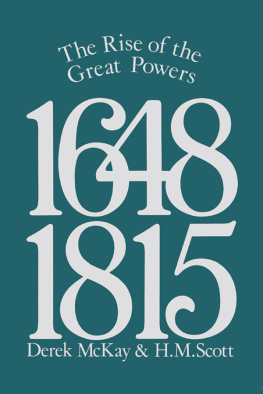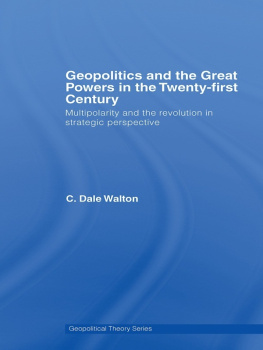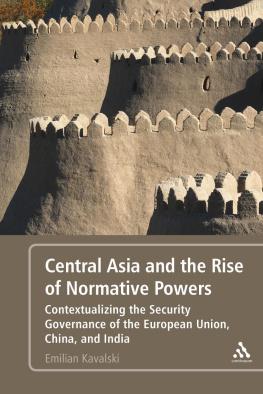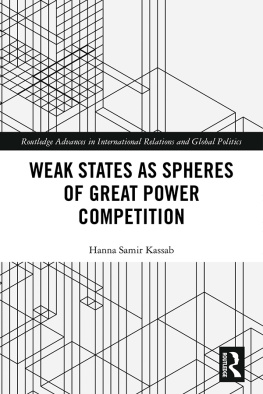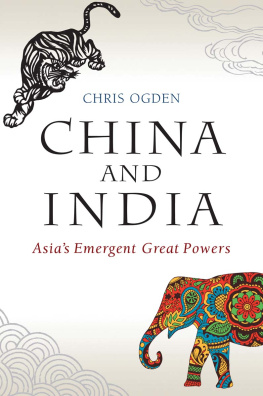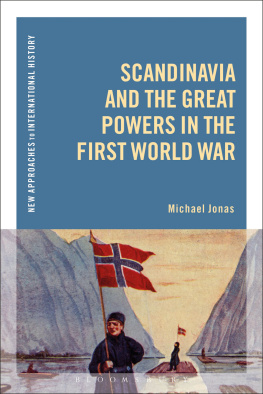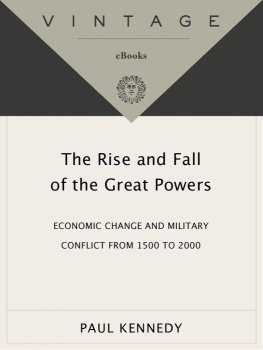THE RISE OF THE GREAT POWERS
16481815
In this sequence:
The rise of the great powers 16481815
Derek McKay and H. M. Scott
The great powers and the European states system 18151914
F. R. Bridge and Roger Bullen
The great powers and the decline of the European states system 19141945
Graham Ross
The rise of
the great powers
16481815
Derek McKay and H. M. Scott
First published 1983 by Pearson Education Limited
Published 2014 by Routledge
2 Park Square, Milton Park, Abingdon, Oxon OX14 4RN
711 Third Avenue, New York, NY, 10017, USA
Routledge is an imprint of the Taylor & Francis Group, an informa business
Copyright 1983 Taylor & Francis. All rights reserved.
Notices
Knowledge and best practice in this field are constantly changing. As new research and experience broaden our understanding, changes in research methods, professional practices, or medical treatment may become necessary.
Practitioners and researchers must always rely on their own experience and knowledge in evaluating and using any information, methods, compounds, or experiments described herein. In using such information or methods they should be mindful of their own safety and the safety of others, including parties for whom they have a professional responsibility.
To the fullest extent of the law, neither the Publisher nor the authors, contributors, or editors, assume any liability for any injury and/or damage to persons or property as a matter of products liability, negligence or otherwise, or from any use or operation of any methods, products, instructions, or ideas contained in the material herein.
British Library Cataloguing in Publication Data
Mckay, Derek.
The rise of the great powers 1648-1815.
1. Europe-Politics and government16481789
2. Europe-Politics and government17891815
I. Title II. Scott, H .M.
940.25 DA273
ISBN 978-0-582-48554-9
Library of Congress Cataloging in Publication Data
Mckay, Derek.
The rise of the great powers 1 648-1815.
Bibliography: p. 345
Includes index:
1. Europe-History-1648-1789. 2. Europe-History-1789-1815. 3. Great powers-History-17th century. 4. Great powers-History-18th century. 5. Great powers-History-19th century. I. Scott,
H.M. (Hamish M.), 1946- II. Title.
D273.5.M36 82-159
ISBN 0-582-48553-3 AACR2
ISBN 0-582-48554-l(pbk.)
For Ragnhild Hatton
Contents
This volume is chronologically the first of three which survey the development of the European states system from 1648 to 1945. The second of these, by F. R. Bridge and Roger Bullen, appeared in 1980 and dealt with the mature states system of the nineteenth century. The preceding period, from the end of the Thirty Years War to the congress of Vienna, saw the emergence of the great powers who were to dominate Europe after 1815, and this is the theme of the present volume. But whereas the full flowering of the European system in the nineteenth century took place in conditions of almost permanent peace, its birth was accompanied by repeated, and often almost continuous, warfare. We have provided short accounts of these wars, but in general we have concentrated on the diplomacy which accompanied the rise of the great powers. Domestic history has only been discussed where this is essential for an understanding of foreign policy.
Diplomatic history has been rather out of fashion in recent years, rather surprisingly since foreign policy was the principal concern of rulers and statesmen in the late seventeenth and eighteenth centuries, and the wars which resulted were important influences on the evolution of government and the development of society. This survey is intended to introduce students of this period to the relations of the great powers. No adequate account of this exists in English. The best introduction is a series in German, which was published before the First World War, while valuable series in French date from no later than the 1950s.
We are very grateful to the staff of Longman for their advice and encouragement, and for so patiently waiting for us to finish the book. For typing our manuscript we have to thank Mrs Irene Perkin and Mrs E. L. Scott. Roy Bridge and Roger Bullen read the whole text and made many helpful suggestions for improving it and Jeremy Black helped us check the proofs. Over many years Professor Ragnhild Hatton has been a source of inspiration and practical we should like to acknowledge what we, together with all students of the seventeenth and eighteenth centuries, owe to her enthusiasm and scholarship. Our wives have helped us most of all.
Derek McKay and H. M. Scott,
London and St Andrews
December 1981
In the mid seventeenth century the German jurist Samuel von Pufendorf defined a states system as several states that are so connected as to seem to constitute one body but whose members retain sovereignty. Such a system existed in the eighteenth century and achieved its classic form between 1815 and 1914. It had been unknown to observers in the sixteenth and first half of the seventeenth centuries, since European politics consisted then of the seemingly unending struggle of minor states against the dominance of the House of Habsburg. But in the decades after 1648 the states system defined by Pufendorf gradually evolved, and by the early eighteenth century had become established in its modern form, one in which several leading powers were almost equally matched. The great powers of the eighteenth and nineteenth centuries were Britain, France, Austria, Russia and Prussia. Three of these had clearly emerged by the 1710s, and Russia and Prussia were generally recognised as major states by the middle years of the century. The first modern great power was France, and she achieved this position in the generation after the peace of Westphalia.
The treaties of Mnster and Osnabrck, collectively known as the peace of Westphalia, brought the Thirty Years War to an end in 1648. In the century and a half before this peace, relations between the European powers had been dominated by the apparent attempt of the House of Habsburg to achieve hegemony and even, at times, universal monarchy. This had become possible because of a fortuitous series of marriages and deaths which had made the Habsburg Charles V ruler of a vast empire. As king of Spain (151656) his monarchy had included not only Spain and immense territories in the Americas and Indies but also the Balearic Islands, Sardinia and Sicily in the Mediterranean, and Naples and Milan in Italy. As duke of Burgundy (150655) Charles had ruled a chain of provinces which encircled France: the so-called Burgundian Circle of the Netherlands, Luxemburg and Franche-Comt. As archduke of Austria (151955) his possessions had been roughly the same as modern Austria, together with parts of Alsace in western Germany. Finally, he had also been elected emperor of the German Holy Roman Empire (151955). Using the wealth of his European and overseas lands and the muscle of his unrivalled Spanish and German infantry, Charles had fought to keep this Habsburg monarchy intact against the challenge of France and also to defend Christendom against the menace of the Muslim Turks in the Balkans and Mediterranean and the Protestants in Germany. The task had been too much for one man, and Charles had accepted this by abdicating in 1555 and dividing his dynastic empire.


